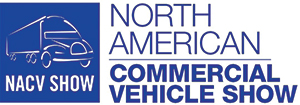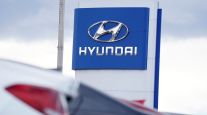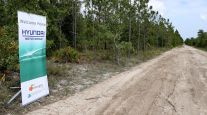Senior Reporter
Hyundai Looks to Bring Hydrogen Fuel-Cell Concept Class 8 to US

[Stay on top of transportation news: Get TTNews in your inbox.]
ATLANTA — Hyundai Motor Co. announced prototypes of a zero-emissions hydrogen fuel cell-powered Class 8 on-highway tractor and a refrigerated trailer with cryogenic cooling technology intended, potentially, for the U.S. market.
The company said it was the only one that could address the case for environmental sustainability in both tractors and trailers, since it makes both.

Lee
“It is my great honor to be here with you today in the United States, which plays a leading role in the global commercial vehicle market,” said Edward Lee, executive vice president of Hyundai’s commercial vehicle division, on Oct. 29. “We are working on extending our business to different parts of the world.”
Hyundai offers commercial vehicles from Class 2 through Class 8 in 130 countries, with plants in South Korea, China and Turkey. None of its trucks are sold in the United States, according to WardsAuto.com.
The announcements came at the North American Commercial Vehicle Show here.
Also at the show, Cummins Inc., Paccar Inc.’s Kenworth Truck Co., Bosch through its stake in Nikola Motor Co. and Daimler Trucks North America detailed their intentions for using hydrogen fuel cells in trucks.

Ziegler
Maik Ziegler, head of commercial vehicle research and development strategy group at Hyundai, told Transport Topics the prospects for deploying Hyundai’s Class 8 vehicle, called the HDC-6 Neptune, in the U.S. “look relatively promising.” The company has had discussions with fleets but Ziegler declined to say how many.
“I think there are chances here in the States to level the electricity-into-hydrogen price if we work together,” he said. “Personally, I already think there is a business case if you take the California grants into consideration. But we are looking really for the big picture, the bigger volume; otherwise we will not enter the market.”
At the same time, through its joint venture with H2 Energy AG, announced in April, Hyundai will build 1,600 fuel cell-powered cab-over-engine heavy-duty trucks for the Swiss commercial vehicle market beginning in 2019 through 2023. H2 Energy is involved in hydrogen production and supply, refueling stations and fuel cell vehicle procurement.
Hyundai sought to style its U.S. concept truck by drawing on the sleek Art Deco design of classic steam locomotives operated by New York Central Railroad in the 1930s.
The truck’s grill lines are continued around the entire lower portion of the truck, which maximizes air flow for additional cooling. The grill concept also conceals the truck’s retractable steps. The entrance to the truck is gained through a sliding door. A virtual tour of the cab revealed an expandable loft-style sleeping platform, a shower, toilet and stove.
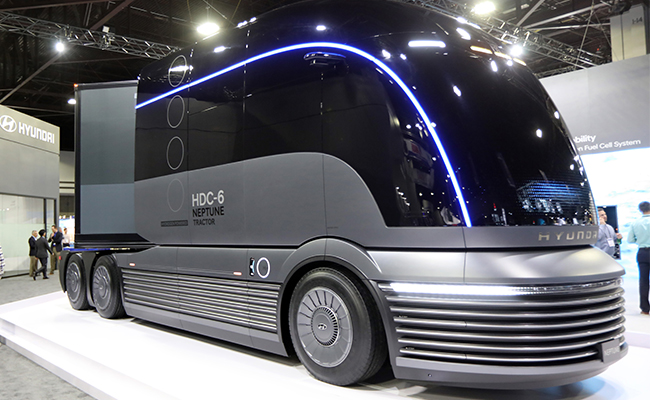
A close-up look at the HDC-6 Neptune. (John Sommers II for Transport Topics)
During the presentation, Lee also mentioned Hyundai’s tractor-trailer combinations already have tested Level 3 autonomous driving on Korean highways. (By 2021, Hyundai plans to roll out autonomous passenger cars with Level 3 automation through its joint venture with Boston-based Aptiv, followed by Level 4 self-driving cars in 2024.)
In the U.S., several startups and traditional truck makers are using the advanced driver assistance systems in Level 2, or partial automation, as the bridge to Level 4 fully autonomous commercial vehicles — skipping over Level 3, or conditional autonomous driving, where a driver is present but not required to monitor the environment though must be ready to take control when notified. Level 4 automated driving is when the truck can drive itself under certain conditions without any driver input or backup assistance.
Meanwhile, the HT Nitro ThermoTech concept trailer is “eco-friendly and highly efficient,” and uses “super-cold” liquid nitrogen to cool air and send it into the cargo space. The coolant is carried in a tank under the trailer, said Stuart James, chief sales officer at Hyundai Translead.
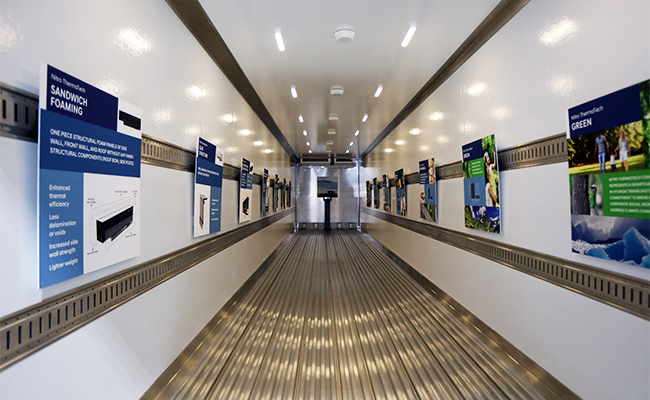
Inside the Hyundai Nitro Thermotech trailer. (John Sommers II for Transport Topics)
The system can hold a steady temperature plus-or-minus 0.5 degree Celsius.
Supplies of liquid nitrogen are available throughout the country, experts said.
Assuming volume production, the system can closely parallel the cost of a traditional reefer unit, James said. But the lifetime costs will be considerably lower. There are almost no moving parts in the system.
“Ours is a very conservative industry and slow to change,” he added. “One of the great innovations introduced was a composite panel, and I will give credit to one of our competitors for having done it years ago. And to this day it has not displaced the good old sheet-post trailer, because they each have their place. I think that is how it will go with this.”
Want more news? Listen to today's daily briefing:


